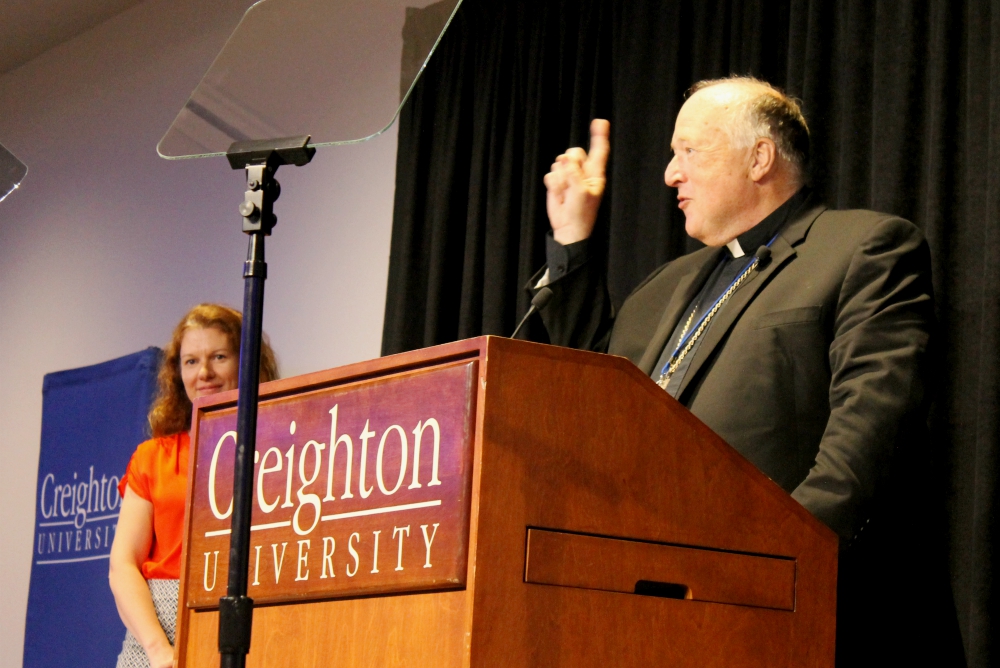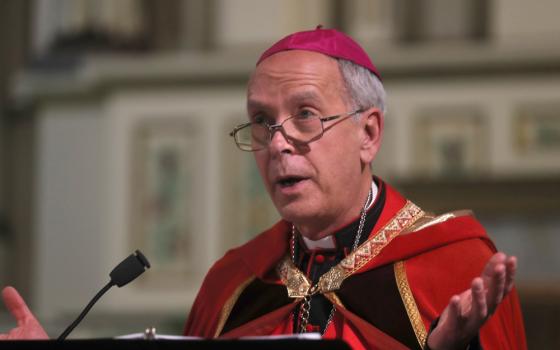
Then-Bishop Robert McElroy of San Diego attends the opening Mass of the Synod of Bishops for the Amazon celebrated by Pope Francis in St. Peter's Basilica at the Vatican Oct. 6, 2019. (CNS/Paul Haring)
Cardinal Robert McElroy, a papal ally on ecological issues, will soon move to Washington D.C., where he will arrive less than two months after Donald Trump's return to the White House.
The appointment by Pope Francis places one of the U.S. Catholic Church's strongest voices on climate change in the nation's capital as Trump begins a second term as president. Trump has vowed to again pull the U.S. out of the Paris Agreement, expand oil and gas production, and gut regulations aimed at reducing pollution that are seen as burdensome on business.
"I think it's going to be a challenging time for the environmental issues that are of concern to the church and lots of young people as well," said Dan Misleh, founder and executive director of the D.C.-based Catholic Climate Covenant.
As bishop of San Diego, McElroy did not shy from calling out Trump's environmentally harmful actions during his first administration. In a speech on voting ahead of the 2020 presidential election, McElroy said, "The United States, which was once a leader in this effort, has in the current Administration become the leader in resisting efforts to combat climate change and in denying its existence. As a consequence, the survival of the planet, which is the prerequisite for all human life, is at risk."
Four years ago, that episcopal critique came from California. Now any future rebukes of Trump's environmental policies would come from just down the road.
As McElroy was introduced Jan. 6 to his future home, the first question from the press concerned the environment.
Advertisement
"I think one of the great challenges for the church in the world at this moment is that of the care for our home on this Earth, for the planet, and all of the abuse which it is suffering," McElroy said.
"It is a top issue, in terms of our world. How are we going to preserve the creation that God has given to us and enhance it?" he asked.
Glimpses of how the cardinal himself might answer that question from his new post in D.C. are evident in his past practices and preaching as head of the San Diego Diocese. From that sunny, coastal perch in Southern California, McElroy oversaw the expansion of solar power at parishes, the buildup of a creation care office, and divestment of the diocese's investment portfolio from the fossil fuel industry — the first U.S. diocese to do so.
Those actions, along with speeches on threats from climate change to life on the planet, established McElroy as a leader among U.S. bishops on creation care and one of the pope's most ardent supporters in responding to his 2015 encyclical, "Laudato Si', on Care for Our Common Home."
"Cardinal McElroy is a strong surrogate for Pope Francis on global climate action," said Meghan Clark, a moral theologian at St. John's University in New York.
Catholics who spoke to EarthBeat said that McElroy's understanding of church teaching on the environment and the scientific consensus on climate change, along with his expertise in politics, foreign policy and moral theology, make him well-suited for the likely politically turbulent climate he may face around the environment.
"As archbishop of Washington, D.C., he will be in a unique position to make the moral case for global action on climate to those shaping the American contribution to global diplomacy," Clark said in an email.
Laudato Si' leader in San Diego
In February 2024, Clark was among a group of theologians and Catholic leaders who joined with bishops for a conference in San Diego assessing the U.S. church's response to Laudato Si' nearly a decade since Francis issued it in the spring of 2015.
While the consensus was that bishops were trailing other parts of the church in taking up the encyclical's calls to action, the host diocese was seen among the outliers.

Attendees during the "Laudato Si': Protecting our Common Home, Building our Common Church" conference at the University of San Diego on Feb. 22-23 (EarthBeat photo/Christopher White)
Arriving in San Diego months before Laudato Si' was published, McElroy quickly encouraged churches in the diocese to consider installing solar panels. To date, roughly 70% of its 97 parishes have done so. In addition, the diocesan pastoral center receives nearly 90% of its electricity from renewable sources.
As bishop, McElroy attended tree plantings, presided at Masses on Earth Day, hired a full-time director of creation care, and promoted education on the scientific underpinnings of climate change. He was one of three U.S. bishops to take part in the Vatican synod for the Amazon.
On policy, he lent support to a carbon tax and dividend proposal. He signed onto a letter to Congress that backed legislation that became the Inflation Reduction Act, which contained more than $300 billion over a decade in clean energy and climate initiatives.
"I've been very impressed with his mastery of both Laudato Si' and issues of climate change, particularly on the climate justice issue," Veerabhadran Ramanathan, a retired professor at the Scripps Institution of Oceanography at the University of California San Diego and member of the Pontifical Academy of Sciences, told EarthBeat in 2022.
In January 2024, the San Diego Diocese announced it had removed fossil fuels from its investments, a decision it said was in line with Francis' urgings for the world to transition from the use of coal, oil and gas for energy. The move was seen as particularly symbolic, in that it was the first divesting diocese in the country that's the largest historical producer of heat-trapping greenhouse gas emissions, and the present-day leader in oil and gas production and consumption.
In addition, McElroy has been outspoken on the threats to life posed by climate change, and the need for the U.S. church to make it a higher priority. He laid out that case in a 2019 keynote address for the first of three "Laudato Si' and the U.S. Catholic Church" conferences organized by Catholic Climate Covenant. He also proposed that the U.S. Conference of Catholic Bishops create a committee focused on Laudato Si'.

San Diego Bishop Robert McElroy counts down before he leads a sing-along of "God Bless America" during the inaugural "Laudato Si' and the U.S. Catholic Church" conference series June 27, 2019, at Creighton University in Omaha, Nebraska. (NCR photo/Brian Roewe)
In his 2020 speech on voting, McElroy placed climate change alongside abortion as "core life issues in Catholic teaching."
"The death toll from abortion is more immediate, but the long-term death toll from unchecked climate change is larger and threatens the very future of humanity," he said.
McElroy continued: "There is a clear international scientific consensus that climate change caused by the use of fossil fuels and other human activities poses an existential threat to the very future of humanity and that air pollution resulting from fossil fuels is already a major cause of premature death on our planet. Existing trajectories of pollutants being placed in the atmosphere by human activity, if unchecked, will raise the temperature of the Earth in the coming decades, generating catastrophic rises in human exposure to deadly heat, devastating rises in water levels and massive exposure to a series of perilous viruses. In addition, there will be severe widespread famines, draughts and massive dislocations of peoples that will cause untold deaths, human suffering and violent conflict."
A green blueprint in DC
San Diego is among 27 U.S. dioceses to sign onto the Vatican's Laudato Si' Action Platform, a multiyear initiative for church institutions at all levels to act on Francis' encyclical. As part of that program, participants have to prepare a Laudato Si' Action Plan.
"I have a confession today," McElroy said during the Monday press conference, "we stole our Laudato Si' Action Plan from the Archdiocese of Washington some years ago. So I'm here to learn as much as to bring new ideas."
The Washington Archdiocese's plan was recreated under Cardinal Wilton Gregory from one he first commissioned while archbishop of Atlanta. Numerous dioceses have since utilized the Atlanta plan as their own blueprint.
"The fact that [Gregory] brought with him his Laudato Si' Action Plan was significant," Misleh said.
Its widespread adoption has made Gregory himself be seen as a leader on Laudato Si' in the U.S. church.
During his time in Washington, Catholic Charities finished the installation of the largest solar project in the district, a 5,072-panel array that Gregory blessed. An archdiocesan creation care committee has also sought to encourage parish-level actions, including guidance on how to shift to solar power. The archdiocese has a power purchase agreement with the local utility to power most of its facilities with clean energy.
The foundation left by Gregory will give McElroy a head start with any initiatives he might look to pursue, Misleh said. Two areas he suggested would be the hiring of a full-time creation care coordinator for the archdiocese, as he did in San Diego, and further expanding solar power. A headwind against any Laudato Si' efforts could come from the archdiocese's $10 million annual deficit.
"We look forward to working with Cardinal McElroy to continue this important work within the Archdiocese of Washington," Misleh said.







